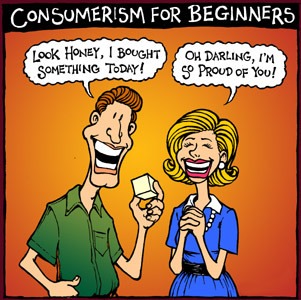Selling the Non-System “System”

According to Andrew Heath and Joseph Potter, the authors of the book, Rebel Sell: Why the Culture Can’t be Jammed, theories such as the one found in the book No Logo, by Naomi Klein, are false and unproductive. The theory, they explain, is actually a critique of mass society, not capitalism. This popular theory, found in various movies and books, and espoused by “counter-culture” consumerists states, “Capitalism requires conformity to function correctly. As a result, the system is based upon a generalized system of repression. Individuals who resist the pressure to conform therefore subvert the system, and aid in its overthrow.” (this.org/) Like Neo in the Matrix, we need to unplug from “the system.” We must become “culture jammers” in order to stall and eventually overthrow “the system.”
Heath and Potter counter this theory by explaining that, “There is no single, overarching system that integrates it all. The culture cannot be jammed because there is no such thing as ‘the culture’ or ‘the system’. (p. 10) So, if there is not a system, then what is there? The authors state, “We do not live in the Matrix, nor do we live in the spectacle. The world that we live in is in fact much more prosaic. It consists of billions of human beings, each pursuing some more or less plausible conception of the good, trying to cooperate with one another, and doing so with varying degrees of success.” (p. 10) The concept of individualism eventually leads to conformity when enough individuals buy into the “non-conformist” status. They explain that these “counter-culture” consumers and theorists believe they are subverting a system that does not even exist. In other words, consumers acquire products that are “anti-establishment,” music that is “anti-corporate” (e.g. Kurt Cobain and punk rock), and buy into a “status” by purchasing counter-mass culture products. However, these individuals are still contributing to capitalism and consumer culture except they are buying “anti-culture” brands, and thereby engaging in a perceived “status” of “counter-culture.” These consumers believe they are rebelling against the culture and “the system” but in reality are creating their own system of ideals and purchasing products that support their perceived reality.
So, what do the authors suggest to help fix this “non-system?” They state, “At this stage of late consumerism, our best bet is legislative action.” (this.org/) They believe that “arms-control agreements” that stall anti-social forms of competition are the key to this process. They explain that individual liberty will be restricted in order to promote a more civilized society. And express that, “In the end, civilization is built upon our willingness to accept rules and to curtail the pursuit of our individual interest out of deference to the needs and interests of others.” (p. 342)
Heath and Potter are doing exactly what a free system allows them to do, questioning the rebellion of the counter-culture and questioning the idea of a system. If the authors haven’t bought into a system, they have begun playing the all too familiar “blame game.” This game requires that everyone buy into the notion that society or “the system” is inherently flawed and that each side knows how to fix it. Perhaps “the system” is an illusion, or perhaps the authors are good salesman of the “system,” trying to sell the idea that there is no system and therefore no need to counter the system.
Were individuals like Gandhi, Jesus and Martin Luther King “culture-jammers” or just people trying to do good?
Are we arguing semantics and/or theories?
Will Heath and Potter sell lots of books in the capitalist “non-system?”
Do you believe there is a “system” or not?
What does a non-capitalist, non-consumer, non-commodification society look like?
Heath, Joseph, and Andrew Potter. The Rebel Sell: How the Counter Culture Became Consumer Culture. Chichester: Capstone Publishing Ltd., 2005.
Also sold as: Nation of Rebels: Why Counterculture Became Consumer Culture
Leave a Reply
You must be logged in to post a comment.